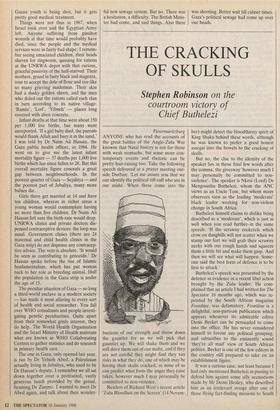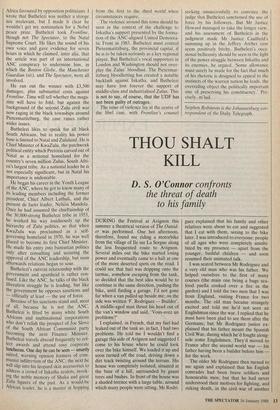THE CRACKING OF SKULLS
Stephen Robinson on the
courtroom victory of Chief Buthelezi
Pietermaritzburg ANYONE who has read the accounts of the great battles of the Anglo-Zulu War knowns that Natal history is not for those with weak stomachs, but some more con- temporary events and rhetoric can be pretty hair-raising too. Take the following speech delivered at a prayer meeting out- side Durban: 'Let me assure you that we can identify the political riff-raff who are in our midst. When these come into the bastions of our strength and throw down the gauntlet for us we will pick that gauntlet up. We will shake them and we will drive them out of our midst, and if they are not careful they might find they run risks in what they do, one of which may be having their skulls cracked, as none of us can predict what form the anger they raise takes, however much I may personally be committed to non-violence.'
Readers of Richard West's recent article 'Zulu Bloodlust on the Screen' (14 Novem- ber) might detect the bloodthirsty spirit of King Shaka behind these words, although he was known to prefer a good honest assegai into the bowels to the cracking of skulls.
But no, the clue to the identity of the speaker lies in those final few words after the comma, the giveaway 'however much I may personally be committed to non- violence'. The speaker is Nkosi (Lord) Dr Mengosuthu Buthelezi, whom the ANC views as an Uncle Tom, but whom many observers view as the leading 'moderate' black leader working for non-violent change in South Africa.
Buthelezi himself claims to dislike being described as a 'moderate', which is just as well when you read further- in the same speech: 'If the scrawny cockerels which crow on dunghills will not scatter when we stamp our feet we will grab their scrawny necks with our rough hands and squeeze them a little bit and make them gasp. And then we will see what will happen. Some- one said the best form of defence is to be first to attack.'
Buthelezi's speech was presented by the defence as evidence in a recent libel action brought by the Zulu leader. He com- plained that an article I had written for The Spectator 18 months ago, which was re- printed by the South African magazine Frond*, was defamatory. Frontline is a delightful, non-partisan publication which appears whenever its admirable editor Denis Becket can be persuaded to come into the office. He has never considered himself to favour any political grouping, and subscribes to the eminently sound 'they're all mad' view of South African politics. Becket is one of the few editors in the country still prepared to take on an establishment figure.
It was a curious case, not least because I had only mentioned Buthelezi in passing to defend him against some silly accusations made by Mr Denis Healey, who described him as an irrelevant stooge after one of those flying fact-finding missions to South Africa favoured by opposition politicians. I wrote that Buthelezi was neither a stooge nor irrelevant, but I made it clear he wouldn't get my nomination for a Nobel peace prize. Buthelezi took Frontline, though not The Spectator, to the Natal Supreme Court. He likes the sound of his own voice and gave evidence for seven hours in which he claimed, inter alia, that the article was part of an international ANC conspiracy to undermine him, in which the Boston Globe, the Manchester Guardian (sic), and The Spectator, were all involved.
He ran out the winner with /3,500 damages, plus substantial costs against Frontline. Time will tell whether the maga- zine will have to fold, but against the background of the second Zulu civil war now raging in the black townships around Pietermaritzburg, the case raises rather wider issues.
Buthelezi likes to speak for all black South Africans, but in reality his power base is limited to Natal and Zululand. He is Chief Minister of KwaZulu, the patchwork political entity which Pretoria carved out of Natal as a notional homeland for the country's seven million Zulus, South Afri- ca's largest tribe. As a national leader he is not especially significant, but in Natal his importance is undeniable.
He began his career in the Youth League of the ANC, where he got to know many of its leading members including the former president, Chief Albert Luthuli, and the Present de facto leader, Nelstm Mandela. Once he had assumed the chieftainship of the 30,000-strong Buthelezi tribe in 1953, he worked his way assiduously Up the hierarchy of Zulu politics, so that when KwaZulu was proclaimed as a self- governing homeland in 1970, he was well placed to become its first Chief Minister. He made his entry into bantustan politics Only after consulting and securing the approval of the ANC leadership, but soon afterwards relations began to sour. *Buthelezi's current relationship with the government and apartheid is rather con- fused. Like the ANC, he talks of the black liberation struggle he is leading, but like the government he opposes sanctions and — officially at least — the use of force. Because of his sanctions stand and, most of all, because he is not the ANC. Buthelezi is feted by many white South Africans and multinational corporations who don't relish the prospect of Joe Slovo of the South African Communist party becoming the next Finance Minister. Buthelezi travels abroad frequently to col- lect awards and attend cosy corporate luncheons. One day he can be seen — smartly suited, warning opinion formers of com- munist infiltration of the ANC; the next he Will slip into his leopard skin accessories to address a crowd of Inkatha zealots, invok- ing the noble memory of Shaka and great Zulu figures of the past. As a would-be African leader, he is a master at hopping from the first to the third world when circumstances require.
The violence around this town should be seen in the context of the challenge to Inkatha's support presented by the forma- tion of the ANC-aligned United Democra- tic Front in 1983. Buthelezi must control Pietermaritzburg, the provincial capital, if he is to be taken seriously as a key regional player. But Buthelezi's vocal supporters in London and Washington should not over- play the Zulus' bloodlust. The Pietermar- itzburg bloodletting has created a notable backlash against Inkatha, and Buthelezi may have lost forever the support of middle-class and industrialised Zulus. This is not to say, of course, that the UDF has not been guilty of outrages.
The issue of violence lay at the centre of the libel case, with Frontline's counsel seeking unsuccessfully to convince the judge that Buthelezi sanctioned the use of force by his followers. But Mr Justice Howard managed to take the longer view. and his assessment of Buthelezi in the judgment made Mr Justice Caulfield's summing up in the Jeffrey Archer case seem positively bitchy. Buthelezi's occa- sional bellicosity should be seen in the light of the power struggle between Inkatha and its enemies, he argued. 'Some allowance must surely be made for the fact that much of his rhetoric is designed to appeal to the instincts of the warrior nation he leads, the overriding object the politically important one of preserving his constituency.' Pre- cisely, nflud.
Stephen Robinson is the Johannesburg cor- respondent of the Daily Telegraph.



















































 Previous page
Previous page